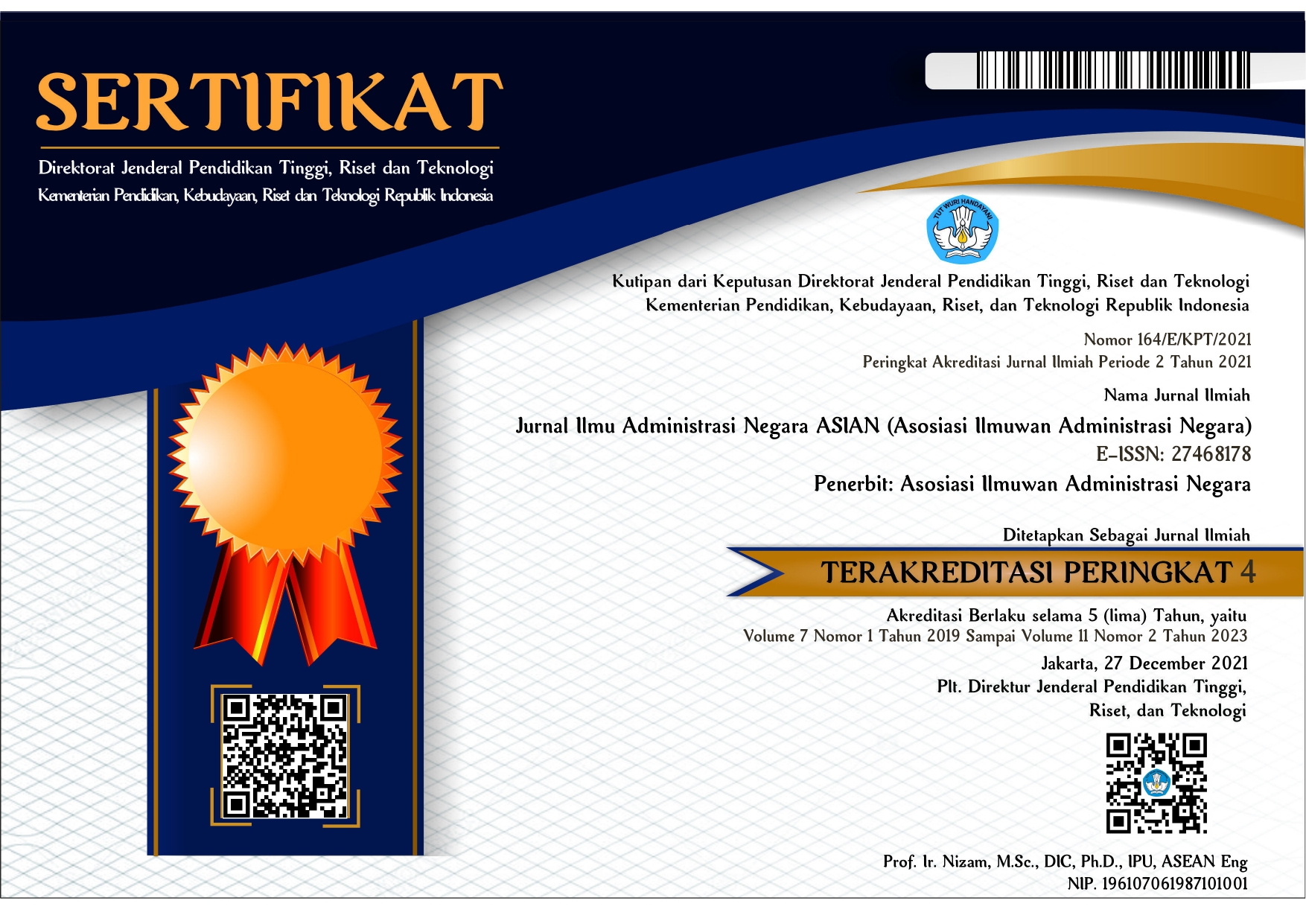Evaluasi Kebijakan Dana Desa Peraturan Bupati No. 71 Tahun 2016 Kabupaten Semarang
Studi kasus di desa Randugunting Kecamatan Bergas
 Abstract views: 766
,
Abstract views: 766
,
 PDF downloads: 1147
PDF downloads: 1147
Abstract
Development is one of the country's benchmarks in the welfare of its people, so development from the village level needs to be done to support equitable development. One of the government's efforts in terms of development is through a village fund program through Semarang Regent Regulation No. 71 of 2016 concerning the procedures for the distribution and determination of village funds in Randugunting Village, Bergas District, Semarang Regency, so that policies need to be evaluated on village fund programs so that they can realize equitable development. This study uses a qualitative method with a descriptive approach. Efforts to provide an assessment or evaluation of village fund policies can be seen through the characteristics of policy evaluations and constraints faced in implementing policy evaluations. The characteristics of policy evaluation consist of a focus on values, interdependence of fact values, present and past orientation, value duality, while the constraints on policy evaluation can be seen from psychological constraints, economic constraints, technical constraints, political constraints, and constraints on evaluation resources. Randugunting Village is an area that needs to be developed, so the variety of considerations are needed to be able to optimize the implementation of village fund program program evaluation in Randugunting Village
Downloads
References
Darmadi, Damai dan Sukidin. 2009. Administrasi Publik. Yogyakarta: LaksBang PRESSindo.
Dunn, William N. 1999. Pengantar Analisis Kebijakan Publik. Yogyakarta: Gadjah Mada. University Press.
Indiahono, Dwiyanto. 2009. Kebijakan Publik Berbasis Dynamic Policy Analisys.Yogyakarta : Gava Media.
Hamdi, Muchlis. 2014. Kebijakan Publik Proses, Analisis, dan Partisipasi. Bogor: Ghalia Indonesia.
Nugroho, R. 2006. Kebijakan Publik. Formulasi, Implementasi dan Evaluasi. Gramedia: Jakarta.
Pasolong, Harbani. 2008. Teori Administrasi Publik. Bandung : Alfabeta.
Thoha, Miftah. 2008. Ilmu Administrasi Publik Kontemporer. Jakarta: Kencana.
Peraturan Bupati Semarang Nomor 71 Tahun 2016 tentang Tata Cara Pembagian dan Penetapan Dana Desa.
Peraturan Gubernur Nomor 48 tahun 2017 tentang Pedoman Pemberian Bantuan Kepada Pemerintah Desa di Jawa Tengah.
Peraturan Menteri Dalam Negeri Nomor 56 Tahun 2015 tentang Kode dan data wilayah Administrasi Pemerintahan.
Peraturan Pemerintah Nomor 43 Tahun 2014 Tentang Peraturan Pelaksanaan UndangUndang Nomor 6 Tahun 2014.
PP Nomor 8 Tahun 2016 tentang Perubahan Kedua Atas PP Nomor 60 Tahun 2014 tentang Dana Desa.
Undang – Undang Nomor 6 Tahun 2014 tentang Desa.
Aljannah, Siti. 2017 .”Evaluasi Alokasi Dana Desa (ADD) dalam Menunjang Pembangunan Desa di Kecamatan Tambusai Utara Kabupaten Rokan Hulu”.
Citra, Dewi Larasati dan Muhammad Okto Adhitama. 2017. “Monitoring dan Evaluasi Program Dana Desa (DD) sesuai dengan UU Nomor 6 Tahun 2014 Tentang Desa”.
Garrat. 2002. Jurnal Ilmu Administrasi Negara. Saputra, I Wayan. 2016. “Efektivitas Pengelolaan Alokasi Dana Desa Pada Desa Lembean Kecamatan Kintamani, Kabupaten Bangli Tahun 2009-2014”. Jurnal Pendidikan Ekonomi.
Setio, Kabul Utomo, Sudamo dan Didik G. Suharto. 2018.”Analisis Good Governance Dalam Pengelolaan Keuangan Desa”. Jurnal.
Copyright (c) 2019 Jurnal Ilmu Administrasi Negara ASIAN (Asosiasi Ilmuwan Administrasi Negara)

This work is licensed under a Creative Commons Attribution-ShareAlike 4.0 International License.
Authors who publish with this journal agree to the following terms:
1. Copyright on any article is retained by the author(s).
2. The author grants the journal, right of first publication with the work simultaneously licensed under a Creative Commons Attribution License that allows others to share the work with an acknowledgment of the work’s authorship and initial publication in this journal.
3. Authors are able to enter into separate, additional contractual arrangements for the non-exclusive distribution of the journal’s published version of the work (e.g., post it to an institutional repository or publish it in a book), with an acknowledgment of its initial publication in this journal.
4. Authors are permitted and encouraged to post their work online (e.g., in institutional repositories or on their website) prior to and during the submission process, as it can lead to productive exchanges, as well as earlier and greater citation of published work.
5. The article and any associated published material is distributed under the Creative Commons Attribution-ShareAlike 4.0 International License









